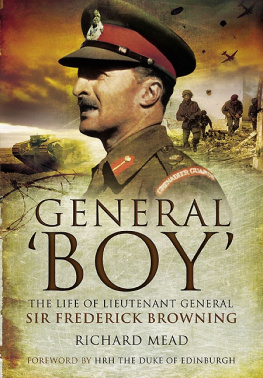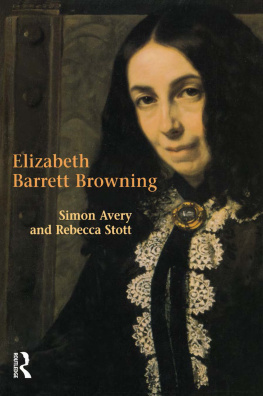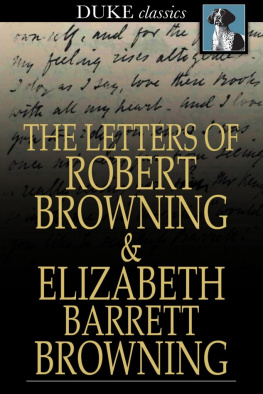There was one, however, who towered above all
I refer to Lieutenant-General Sir Frederick Browning,
known to us all as General Boy.
General Sir Richard Gale, With the Sixth Airborne Division in Normandy

First published in Great Britain in 2010 by
Pen & Sword Military
An imprint of
Pen & Sword Books Ltd
47 Church Street
Barnsley
South Yorkshire
S70 2AS
Copyright Richard Mead 2010
ISBN 978 1 84884 181 9
ePub ISBN: 9781844683369
PRC ISBN: 9781844683376
The right of Richard Mead to be identified as Author of this work has been
asserted by him in accordance with the Copyright, Designs and Patents Act 1988.
A CIP catalogue record for this book is
available from the British Library
All rights reserved. No part of this book may be reproduced or transmitted in any
form or by any means, electronic or mechanical including photocopying, recording
or by any information storage and retrieval system, without permission from the
Publisher in writing.
Typeset in 10pt Palatino by Mac Style, Beverley, East Yorkshire
Printed and bound in the UK
By CPI
Pen & Sword Books Ltd incorporates the Imprints of
Pen & Sword Aviation, Pen & Sword Maritime, Pen & Sword Military,
Wharncliffe Local History, Pen & Sword Select, Pen & Sword Military Classics,
Leo Cooper, Remember When, Seaforth Publishing and Frontline Publishing
For a complete list of Pen & Sword titles please contact
PEN & SWORD BOOKS LIMITED
47 Church Street, Barnsley, South Yorkshire, S70 2AS, England
enquiries@pen-and-sword.co.uk
www.pen-and-sword.co.uk
Contents
List of Maps
Foreword by HRH The Duke of Edinburgh

BUCKINGHAM PALACE
I am delighted that Richard Mead decided to write a biography of General Sir Frederick Boy Browning. He was a very remarkable man with huge ability and great charm. He was a member of a generation which had to face the traumas of active service in two world wars; in front-line service in the first, and with all the heavy responsibilities, and risks, of higher command in the second.
Although I did meet him while he was serving as Chief of Staff to my uncle Dickie Mountbatten as Supreme Allied Commander in South East Asia, it was only when he came to us as Comptroller and Treasurer that I got to know him well. As I was still serving with the Navy, and expected to go on doing so for many years, I was inevitably away from home for much of that time. His seniority in the Army, his connection with the Grenadier Guards and his wide circle of friends in positions of responsibility, were immensely valuable to the Queen and myself in the early years after our marriage.
Even though we were in different age groups, and with different service backgrounds, we did have one great interest in common. We both enjoyed boats and yachting. It was in his converted MFV Fanny Rosa that I stayed during my first visit to Cowes Regatta in 1948.
His last years were sad, but they were only a very small part of his long, active and distinguished career.

Introduction
I n selecting a British general of the Second World War for a new biography, I had a short list of eight, the only qualification for inclusion being that no such work already existed. The list comprised senior officers of distinction, some of whom had led large formations in the field, whilst others had exercised considerable influence from behind the scenes. One name stood out, however, a man whose military career had not matched those of some of the other contenders, but who was in every other way more interesting. Lieutenant General Sir Frederick Browning called Boy in this book from the time he received the nickname, prior to which he is Tommy, his name in the family has long been of some interest to military historians as a result of his close association with Great Britains airborne forces during the Second World War. Their interest has focused on his involvement in Operation Market Garden and the disaster at Arnhem, in connection with which he allegedly gave a now much-used expression to the English language a bridge too far. However, it is also generally recognized that he was decorated for bravery in the Great War, represented his country at two sports, initiated a tradition at Sandhurst which persists to this day and served as a senior member of the Royal Household. To cap it all, he was married to one of the most enduringly popular novelists of the twentieth century, Daphne du Maurier. Why, then, had no biography appeared many years before?
Boy himself discouraged any such work in his lifetime, indeed he went so far as to obtain undertakings from some of those who served on his staff at South-East Asia Command that they would not cooperate with any potential biographer. After his death the members of his family were approached on more than one occasion by a would-be author but were unenthusiastic, whilst Daphne herself refused to write about him. Subsequently Boy did not come out well from the works of some historians, and indeed film directors, who covered Market Garden, but nobody appeared to have researched his role or his background in any depth, his detractors at best repeating the charges made by others, at worst resorting to little short of character assassination. It was time for a closer look.
Quite why Arnhem continues to exert such fascination is something of a mystery, although it probably has something to do with the British love of heroic failure: Sir John Moores retreat to Corunna, the Charge of the Light Brigade and the evacuation of the BEF from Dunkirk would be other good examples. The flow of books on the subject seems never-ending, notwithstanding that little in the way of new information has emerged over the last twenty years. British authors have, for the most part, concentrated on the exploits of 1 Airborne Division and the attempts of Horrockss cavalry to relieve them. The deeds of the two American airborne divisions, other than in the crossing of the Waal at Nijmegen, have had much less prominence, whilst the actions of VIII and XII Corps have largely been ignored.
The criticisms of Boy have thus tended to be from the perspective of those concerned with Arnhem itself, which was not just a failure, but a disaster. This also explains something which I had not hitherto realized, which was that Boy has been far from popular with some of the veterans of 1 Airborne, who attach much of the blame for the debacle to him, compounding this with his subsequent treatment of the Polish General Sosabowski, who to many of them was a hero. This contrasts completely with the views of those who served under him at other times, who have by and large been great admirers.
Although almost every book on Arnhem, or on Market Garden as a whole, refers to Boy, his appearance has been episodic, none of them following him closely through either the planning or the execution of the operation. I have tried to put him more firmly in context and the result produces alternative explanations for some of his decisions and actions to those which have become widely accepted, although a number of the criticisms continue to stick. Because I have decided to look at Market Garden from Boys perspective, trying to focus on what he did and what he knew, I have written relatively little on the battle at Arnhem itself. It is more than just background noise, a description which might apply for the most part to the operations of VIII and XII Corps and, to some extent, of the US 101 Airborne Division, but it is not detailed, because Boy was largely unaware of events there, a fact which has, rightly or wrongly, led to much criticism of his role. However, the reader has a wide choice of literature should he wish to know more indeed one is led to wonder if the world can really take much more on the subject.
Next page















